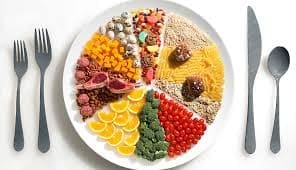Healthy Eating for Beginners: Best Nutrition Tips for Starters

When starting to workout, your diet plays a crucial role in performance, recovery, and overall results. Eating the right foods helps build muscle, burn fat, and maintain energy levels. This guide will break down everything you need to know about healthy eating for fitness, including macronutrients, meal timing, hydration, and sample meal plans.
1. Understanding Macronutrients (Protein, Carbs, and Fats)
1.1 Protein: Muscle Growth and Recovery
Protein is essential for muscle repair and growth, making it a key nutrient for anyone starting a workout routine.
? Benefits:
✔ Supports muscle recovery and repair
✔ Helps build lean muscle mass
✔ Keeps you full longer
? Best Sources:
- Lean meats (chicken, turkey, lean beef)
- Fish (salmon, tuna, cod)
- Eggs
- Dairy (Greek yogurt, cottage cheese)
- Plant-based sources (tofu, tempeh, lentils, beans)
- Protein powder (whey, casein, or plant-based)
? Recommended Intake:
- General fitness: 1.2–1.6g of protein per kg of body weight
- Muscle building: 1.6–2.2g of protein per kg of body weight
1.2 Carbohydrates: Energy for Workouts
Carbohydrates provide fuel for your workouts and help with recovery.
? Benefits:
✔ Provides quick and sustained energy
✔ Helps replenish glycogen stores post-workout
✔ Supports brain function and endurance
? Best Sources:
- Whole grains (brown rice, quinoa, whole wheat bread)
- Starchy vegetables (sweet potatoes, potatoes, carrots)
- Fruits (bananas, apples, berries)
- Legumes (beans, lentils, chickpeas)
? Recommended Intake:
- Low activity: 3-5g of carbs per kg of body weight
- Moderate activity: 5-7g of carbs per kg of body weight
- High activity: 7-10g of carbs per kg of body weight
1.3 Fats: Essential for Hormones and Recovery
Healthy fats support hormone production, joint health, and overall well-being.
? Benefits:
✔ Supports hormone balance (especially testosterone)
✔ Reduces inflammation and aids recovery
✔ Helps with brain function and heart health
? Best Sources:
- Avocados
- Nuts (almonds, walnuts, cashews)
- Seeds (chia seeds, flaxseeds, sunflower seeds)
- Olive oil and coconut oil
- Fatty fish (salmon, mackerel, sardines)
? Recommended Intake:
- 20-35% of total daily calories from fats
2. Meal Timing: When to Eat for Maximum Performance
2.1 Pre-Workout Nutrition
Your pre-workout meal should provide energy and prevent muscle breakdown.
? What to Eat Before a Workout:
- Carbs for quick energy (bananas, oatmeal, whole wheat toast)
- Protein to protect muscles (eggs, Greek yogurt, protein shake)
- Healthy fats in small amounts (nuts, seeds, avocado)
? Example Pre-Workout Meals:
✅ Whole wheat toast with peanut butter and banana
✅ Oatmeal with berries and protein powder
✅ Chicken and brown rice (if eating 2-3 hours before workout)
⏳ Timing: Eat 30 minutes to 2 hours before exercise.
2.2 Post-Workout Nutrition
Post-workout nutrition helps replenish energy and repair muscles.
? What to Eat After a Workout:
- Protein to repair muscles (chicken, fish, eggs, protein shake)
- Carbs to replenish glycogen (sweet potatoes, quinoa, fruit)
- Healthy fats in small amounts (olive oil, nuts)
? Example Post-Workout Meals:
✅ Grilled chicken with quinoa and steamed vegetables
✅ Protein smoothie with banana, whey protein, and almond milk
✅ Scrambled eggs with whole wheat toast and avocado
⏳ Timing: Eat within 30-60 minutes after your workout.
3. Hydration: The Key to Performance
Staying hydrated is crucial for energy levels, endurance, and muscle function.
? How Much Water to Drink:
- General recommendation: 2-3 liters per day
- Before workout: 500ml (17 oz) 30-60 minutes before
- During workout: Sip water as needed
- After workout: 500-1000ml (17-34 oz)
? Electrolytes: If sweating a lot, drink coconut water or add a pinch of salt to water to replenish electrolytes.
4. Sample Healthy Meal Plan for Beginners
Breakfast:
? Oatmeal with almonds, chia seeds, and berries
? Scrambled eggs with whole wheat toast and avocado
Snack (Pre-Workout):
? Banana with peanut butter
? Protein shake with almond milk
Lunch (Post-Workout):
? Grilled chicken with quinoa and roasted vegetables
? Tuna salad with olive oil dressing and whole grain crackers
Snack:
? Cottage cheese with honey and walnuts
? Greek yogurt with granola
Dinner:
? Baked salmon with sweet potatoes and steamed broccoli
? Lentil soup with whole grain bread
5. Foods to Avoid (Or Limit) When Starting a Workout
❌ Processed foods (chips, candy, fast food)
❌ Sugary drinks (soda, excessive fruit juice)
❌ Alcohol (can impair muscle recovery)
❌ Fried foods (high in unhealthy fats)
❌ Excessive refined carbs (white bread, pastries, sugary cereals)
6. Supplements: Do You Need Them?
Supplements are not necessary but can help if you're struggling to meet nutrient needs.
✅ Whey or plant-based protein – helps meet protein goals
✅ Creatine monohydrate – boosts strength and endurance
✅ Omega-3 fish oil – reduces inflammation and supports heart health
✅ Multivitamin – fills in nutritional gaps
✅ Electrolytes – useful for intense workouts or sweating a lot
Conclusion
Healthy eating is essential for maximizing workout performance, recovery, and results. Focus on whole foods, balance macronutrients, stay hydrated, and time meals properly. With the right nutrition, you’ll build strength, improve endurance, and feel better overall.
Would you like a personalized meal plan? Let me know! ???
Post Created: February 11, 2025, 8:36 am
If this post gave you valuable insights or helped you in any way, consider supporting me! Your contribution allows me to continue producing helpful, high-quality content that everyone can benefit from. It’s thanks to supporters like you that I can keep sharing my passion and expanding this community. ❤️
